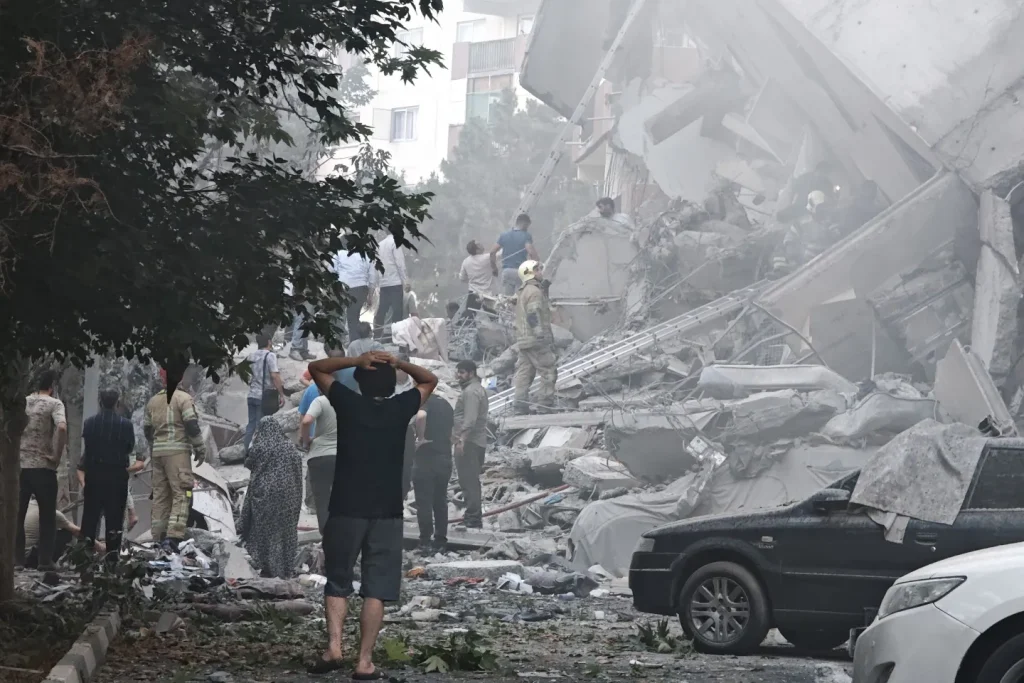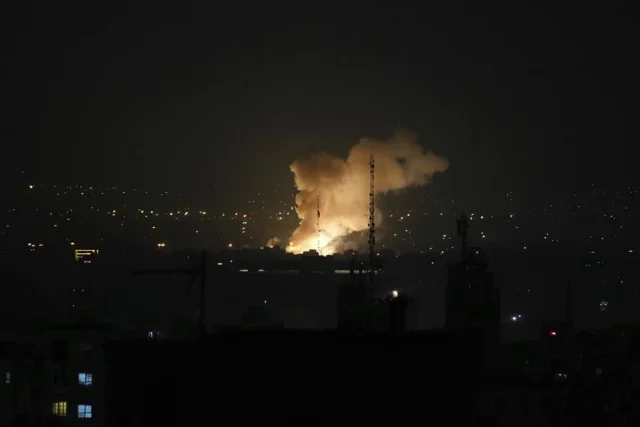By Rehan Khan
ISLAMABAD, Friday, June 13, 2025 (WNP): Israel on Friday launched a wide-ranging military assault on Iran, targeting nuclear facilities, missile production sites, and top military commanders describing as the beginning of a prolonged campaign to prevent Tehran from developing a nuclear weapon.
Dubbed Operation Rising Lion, the offensive involved around 200 Israeli fighter jets striking over 100 locations across Iran. Israeli Prime Minister Benjamin Netanyahu, in a recorded message, said the operation would continue “for as many days as it takes” to eliminate the perceived existential threat posed by Iran’s nuclear ambitions.
“This is a decisive moment in Israel’s history,” Netanyahu declared. “Israel has acted to roll back the Iranian threat to our very survival.”
In retaliation, Iran launched approximately 100 drones toward Israeli territory, according to Israeli military spokesperson Brigadier General Effie Defrin, who confirmed that air defense systems were actively intercepting the incoming barrage.
Iranian state media and eyewitnesses reported explosions in several regions, including near the Natanz nuclear facility – central to Iran’s uranium enrichment efforts. The elite Islamic Revolutionary Guard Corps (IRGC) confirmed that its commander-in-chief, Hossein Salami, was killed, and the IRGC’s headquarters in Tehran was also hit. A residential strike in the capital reportedly killed several children.
In a statement, Iran’s Supreme Leader Ayatollah Ali Khamenei condemned the Israeli assault as a “wicked and bloody crime” and vowed that Israel would face a “bitter fate.”
Iranian media reported the deaths of two senior nuclear scientists, Fereydoun Abbasi and Mohammad Mehdi Tehranchi, in strikes on Tehran. However, Iran’s National Oil Refining and Distribution Company said its refining and storage facilities remained operational and undamaged.
The Israeli military claimed that among those killed in the strikes were the chief of staff of the Iranian Armed Forces, the IRGC commander, and the head of Iran’s Emergency Command.
Meanwhile, Israel declared a state of emergency, and Tel Aviv’s Ben Gurion Airport was closed indefinitely. Iran, too, shut down its airspace amid heightened tensions. Airlines quickly diverted or canceled flights across the region, including over Iraq and Jordan.
Israeli military chief Lieutenant General Eyal Zamir said tens of thousands of reservists had been mobilized. “We are amidst a historic campaign unlike any other,” Zamir said. “This is a critical operation to prevent an existential threat from an enemy committed to our destruction.”
Israeli Foreign Minister Gideon Saar launched a flurry of diplomatic outreach to brief counterparts worldwide on the military action, the foreign ministry said.
The United States distanced itself from the operation. President Donald Trump, speaking to reporters, said, “Iran cannot have a nuclear bomb,” adding that Washington still hoped to return to negotiations.
However, Israeli officials, speaking to local media, claimed that the offensive had been coordinated with Washington. U.S. Secretary of State Marco Rubio refuted those claims, stating that Israel had acted independently and reaffirmed that “Iran should not target U.S. interests or personnel.”
Despite the strikes, U.S. and Iranian officials are still expected to meet for a sixth round of nuclear talks in Oman on Sunday, according to American and Omani diplomatic sources.
A senior U.S. intelligence official, meanwhile, said there had been no change in Washington’s assessment that Iran was not actively pursuing a nuclear weapon. Intelligence suggests that Supreme Leader Khamenei has not reversed his longstanding directive suspending Iran’s weapons program since 2003.
Israeli sources said Israel’s Mossad intelligence agency had also conducted coordinated sabotage operations inside Iran in a bid to disabling strategic missile and air defense installations.
The U.N. Secretary-General Antonio Guterres urged all parties to exercise “maximum restraint.” In a statement via deputy spokesperson Farhan Haq, Guterres warned that the region “can hardly afford” a further descent into open conflict.
Markets reacted swiftly to the escalation. Global oil prices surged, while stocks dropped sharply in Asia, and investors moved toward traditional safe havens such as gold and the Swiss franc.
Iran’s government, in a statement, called the Israeli strikes “cowardly,” arguing they reinforced Tehran’s insistence on pursuing nuclear technology and missile development for self-defense. The military warned that both Israel and the United States would “pay a heavy price” for the attack, accusing Washington of complicity – an allegation denied by U.S. officials.

Despite rumors circulating online, Iranian security sources confirmed that Supreme Leader Khamenei is alive and receiving regular briefings on the evolving situation.
As the dust settles from the first wave of attacks, analysts warn that the Middle East could be on the brink of a new and more dangerous phase of confrontation – with consequences far beyond the region.




